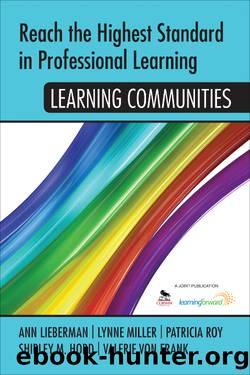Reach the Highest Standard in Professional Learning: Learning Communities by Hord Shirley M.;Roy Patricia A.;

Author:Hord, Shirley M.;Roy, Patricia A.;
Language: eng
Format: epub
ISBN: 1566378
Publisher: Corwin Press
Published: 2014-08-15T00:00:00+00:00
Seventh- and eighth-grade mathematics teachers will learn and consistently implement instructional strategies that improve functions and algebraic thinking so that the achievement gap between white and Hispanic/African-American students is reduced by 8% or better as measured by the districtâs benchmark assessment and the annual state assessment.
Step 3: Develop Educatorsâ Knowledge and Skills
Step 3 focuses on educators engaging in professional learning in order to extend their knowledge and skills regarding new practices, content, content-specific pedagogy, how students learn, and management of classroom environments that support solutions to studentsâ learning needs.
Many educators report that their typical professional learning involves watching a video clip of a new instructional practice. The video clip might take place at a different grade level or in a different content area than that of the teachers who are viewing it, yet once they have watched this demonstration, they are expected to employ that new practice with their students.
Experts in the field of professional learning donât believe that experience is sufficient for changing instructional behavior. Bruce Joyce and Emily Calhounâs (2010) study of professional development suggests that there are several components that need to be planned and executed when a new curriculum or instructional practice is introduced. First, knowledge of new content and understanding student learning outcomes is essential. This knowledge is not casual; it needs to be deeply understoodâat teachersâ fingertipsâso they can use it with ease when planning courses, units of study, and individual lessons. Principals, assistants, and instructional coaches also need to understand content and the depth of knowledge involved in new student learning outcomes in order to provide appropriate feedback and assistance for instruction.
In addition, other topics might include content-specific pedagogy, how students of different ages or learning styles learn new information, differentiated instruction strategies, and classroom management techniques, especially if students are expected to learn collaboratively with their peers. Developing the knowledge base includes understanding (1) components parts, (2) critical attributes, (3) underlying theory, and (4) when to use or not use specific strategies. Even though many educators might want to jump to learning new strategies first, knowledge provides the foundation for the effective use of new strategies and the development of professional decision making (Joyce & Calhoun, 2010; Marzano, Pickering, & Pollock, 2001).
Step 3 also involves developing new instructional skills. New instructional strategies are also built through understanding essential components and critical attributes. Demonstrations play an important role in learning to use new strategies, but study in this area suggests that at least 20 or more demonstrations are needed over the course of a year to build new practices. These examples can be accomplished through demonstration lessons conducted by instructional coaches, outside experts, or expert team members, observations of a master teacher, or videos. To be used most effectively, observations and demonstrations require additional investigations: labeling the essential components, collaborative discussions, and analysis of strengths and barriers.
A third component, required for development of new skills, involves planning and preparation. New curriculum and student learning outcomes will require the use of different instructional strategies. Some of these strategies are material intensive.
Download
This site does not store any files on its server. We only index and link to content provided by other sites. Please contact the content providers to delete copyright contents if any and email us, we'll remove relevant links or contents immediately.
Deep learning with TensorFlow and Keras by Derrick mwiti(827)
Understanding PDA Autism in Kids: A Guide for Parents and Teachers to Support Neurodiverse Learners by Jehu Len(578)
The Victorian Era: A Captivating Guide to the Life of Queen Victoria and an Era in the History of the United Kingdom Known for Its Hierarchy-Based Social Order by Captivating History(441)
Brain Teasers to Build Critical Thinking Skills: Brain Exercises for Tech, Banking, Case Interview Prep, and to Keep Your Mind Sharp by Kris Safarova(421)
Brain Teasers to Build Critical Thinking Skills by Safarova Kris(420)
100 Ideas for Secondary Teachers: Engaging Parents by Janet Goodall & Kathryn Weston(393)
Python 101 - Fundamentals by Sam(379)
Critical Curriculum Leadership : A Framework for Progressive Education by Rose M. Ylimaki(373)
Writing Solid Code: Development Philosophies for Writing Bug-Free Programs by Steve Maguire(364)
Intersectionality in Educational Research by Dannielle Joy Davis; James L. Olive; Rachelle J. Brunn-Bevel; Susan R. Jones(343)
The Art of Emotional Validation: Improve Your Communication Skills and Transform Your Relationships by Validating Emotions and Feelings by Emily Wright(341)
The Knights Templar: An Enthralling History of the Rise and Fall of the Most Influential Catholic Military Order by Wellman Billy(336)
A Beginner's Guide to SSD Firmware by Unknown(332)
The Future Knowledge Compendium by Ellyard Peter;(325)
How to be assertive in any situation by Hadfield Sue & Hasson Gill(317)
Making Connections in and Through Arts-Based Educational Research by Hala Mreiwed Mindy R. Carter Sara Hashem Candace H. Blake-Amarante(314)
What Every Teacher Should Know about Learning, Memory, and the Brain by Tileston Donna E. Walker;(313)
Foundations of Educational Research by Victoria Elliott(309)
Message from the Pleiades; The Contact Notes of Eduard Billy Meier v1 only by unknow(307)
